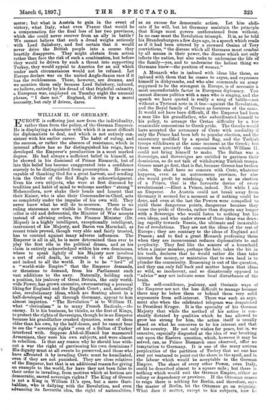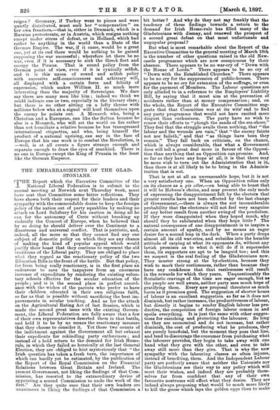WILLIAM IL OF GERMANY. E UROPE is suffering just now from
the individuality, rather than from the policy, of the German Emperor. He is displaying a character with which it is most difficult for diplomatists to deal, and which is not entirely con- sistent with his earlier career. The habit of ruling, and the success, or rather the absence of resistance, which in internal affairs has so far distinguished his reign, have developed the Emperor's peculiarities in a most marked degree. He had always a sufficient belief in himself, as he showed in his dismissal of Prince Bismarck, but of late this belief has become exaggerated into a confidence scarcely to be distinguished from presumption. He seems capable of thanking God for a great harvest, and sending him the Order of the Red Eagle in acknowledgment. Even his own subjects, who were at first disposed by tradition and habit of mind to welcome another " strong ' Hohenzollern, now shake their heads and lament that their Kaiser, who is also their Commander-in-Chief, acts so completely under the impulse of his own will. They never know what he will do to-morrow. There is no ruling statesman now visible in Germany, for the Chan- cellor is old and deferential, the Minister of War accepts instead of advising orders, the Finance Minister (Dr. Miguel) is a highly intelligent, exceptionally intelligent, instrument of his Majesty, and Baron von Marschall, as recent trials proved, though very able and fairly trusted, has to contend against many adverse influences. The Emperor is all in all, he is more determined than ever to play the first role in the political drama, and as his claim is entirely acknowledged within his own dominions, where to speak lightly of his Majesty now involves a sort of civil death, he extends it to all Europe, and indeed to all the world. It is to be " lord" of a "world-wide Empire" that the Emperor demands, or threatens to demand, from his Parliament such vast additions to the navy. Naturally, holding such a position, his jealousy of Great Britain, the only world- wide Power, has grown excessive, overmastering a personal liking for England and the English Court ; and, naturally also, revolutionary ideas, which are floating about in a half-developed way all through Germany, appear to him almost impieties. "The Revolution" is to William II. what " clericalism" is to many French Radicals,—the enemy. It is his business, he thinks, as the first of Kings, to protect the rights of Sovereigns, though he is an Emperor because his grandfather crushed dynasties, some of them older than his own, by the half-dozen, and he cannot bear to see the " sovereign rights " even of a Sultan of Turkey interfered with. Suppose Abd-ul-Hamid has massacred _Armenians, they were his own subjects, and were almost in rebellion. Is that any reason why he should lose with- out a war the right of garrisoning his own dominions ? His dignity must at all events be preserved, and those who have affronted it by invading Crete must be humiliated, even if they are not punished. They are close relatives of the Emperor, but that is an additional reason for giving an example to the world, for have they not been false to their order in invading, from motives which at bottom are democratic, sacred sovereign rights ? The King of Greece is not a King in William IL's eyes, but a mere Gari- baldian, who is dallying with the Revolution, and even advancing its favourite idea, the right of nationalities, as an excuse for democratic action. Let him abdi.• cate if he will, but let Germany maintain the principle that Kings must govern unthreatened from without. In no case must the Revolution triumph. It is, as he told his Brandenburgers a few days ago, in a speech which reads as if it had been uttered by a crowned Ossian of Tory convictions, " the disease which all Germans must combat by all means in their power, the disease which not only infects the nation, but also seeks to undermine the life of the family—yes, and to undermine the holiest thing we Germans know—the position of woman."
A Monarch who is imbued with ideas like these, so imbued with them that he ceases to argue, and expresses himself in dithyrambs, and who also commands an army supposed to be the strongest in Europe, is of necessity a. most uncomfortable factor in European diplomacy. You cannot discuss politics with a man who is singing, and the speech we have quoted is really a song of battle—not without a Tyrtsean note in it too—against the Revolution, and the Royal family of Greece as fosterers of the same. It would not have been difficult, if the Emperor had been a man like his grandfather, who subordinated himself to his policy, to arrange the Cretan difficulty by a few reasonable concessions to Greek pride. The Greeks would have accepted the autonomy of Crete with cordiality if only the Prince had been left to popular election, and the suzerainty modified by a special flag, and the Turkish troops withdrawn at the same moment as the Greek; but those were precisely the concessions which William II. could not bring himself to make. The Sultan was a Sovereign, and Sovereigns are entitled to garrison their dominions, so do not talk of withdrawing Turkish troops. Greece must go first, that is flat, because Greece has broken rules. She shall have no concern with Crete, whatever happens, even as an autonomous province, for else she would profit by misdoing; while as to an election of a Prince, that is the favourite device of every revolutionist :—Elect a Prince, indeed. Not while I ani an Emperor. As Austria. could not break away from Germany it seemed for a moment as if nothing could be done, and even at the last the Powers were compelled to yield these dangerous points, dangerous because they rouse the pride of Greeks, rather than dispute any longer with a Sovereign who would listen to nothing but his own ideas, and who under stress of those ideas was draw- ing rapidly towards Russia, the ultimate and inexorable foe of revolutions. They are not the ideas of the rest of Europe ; they are contrary to the ideas of England and France ; and to find a great Monarch professing them when they are inconvenient reduces diplomatists to sad perplexity. They feel like the seniors of a household when a junior member, perhaps the heir, takes the bit in his teeth, declares that he would rather die than take interest for money, or maintains that to own land is to plunder the community. Reasoning is out of the question, and they can only fall back and mutter hopes that ideas so wild, so incoherent, and so disastrously opposed to "advice" may not indicate some local disturbance of the brain.
The self-confidence, jealousy, and Ossianic ways of the Emperor are not the less difficult to manage because there may be below them or behind them very solid arguments from self-interest. There was such an argu- ment also when the celebrated telegram was despatched to President Kruger. It is the specialty of his German Majesty that while the method of his action is con- stantly dictated by qualities which he has allowed to grow too strong for him, the action itself is usually based on what he conceives to be his interest and that of his country. He not only wishes for peace, but is, we conceive, especially disgusted at the idea of war breaking out upon the Eastern question, which, however it may be solved, can, as Prince Bismarck once observed, offer no temptation to Germany. It is one of the many serious perplexities of the partition of Turkey that no one has ever yet ventured to point out the share in the spoil, and in the labour which would be acceptable to the German Empire. The share of every other Power, even Italy, could be described almost to a square mile ; but there is nothing which would suit the German Empire, either as colony or dependency or province. If the Ottoman ceases to reign there is nothing for Berlin, and therefore, says the master of Berlin, let the Ottoman go on reigning. What does it matter, except to his subjects, how he reigns ? Germany, if Turkey went to pieces and were quietly distributed, must seek her "compensation" on her own frontiers,—that is, either in Denmark, which is a Russian protectorate, or in Austria, which resigns nothing except under stress of defeat, or in Holland, which had rather be anything in the world than a State of the German Empire. The war, if it came, would be a great one, yet at its end there would be nothing to be gained supposing the war successful ; wherefore let there be no war, even if it is necessary to sink the Greek fleet and occupy the Piraeus. That is sound policy from the German point of view, even if it is cynically selfish, and it is this union of sound and selfish policy with excessive self-consciousness and arbitrary will, all displayed with a certain force and felicity of expression, which makes William II. so much more interesting than the majority of Sovereigns. We dare say there are many men like him ; indeed we think we could indicate one or two, especially in the literary class ; but there is no other sitting on a lofty throne with millions below who at a signal will hurl themselves upon the enemy he points out. A Monarch who, being a Christian and a European, can like the Sultan because he also is a Monarch, who will set the world on fire rather than not humiliate a relative because he has transgressed international etiquettes, and who, being himself the product of a national uprising, can say in the face of Europe that his one work is to combat the Revolution, is —well, is at all events a figure strange enough and separate enough to draw the eyes of mankind. There is no one in Europe except the King of Prussia in the least like the German Emperor.







































 Previous page
Previous page